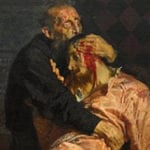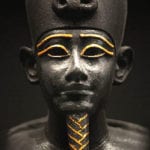 Weird Stuff
Weird Stuff  Weird Stuff
Weird Stuff  Mysteries
Mysteries 10 Tragic Disappearances and Deaths in Joshua Tree National Park
 History
History 10 Ways Childhood Really Sucked in the Old West
 Music
Music 10 Name Origins of Famous Bands from the 1990s
 Religion
Religion 10 Biggest Turnarounds by the Catholic Church
 Weird Stuff
Weird Stuff 10 Unbelievable Times Laws Had Unintended Consequences
 Humans
Humans Ten Historic Women Who Deserve Way More Credit Than They Got
 Movies and TV
Movies and TV 10 Films That Spawned Major Lawsuits
 History
History Ten Times Towns Were Wiped Off the Face of the Earth
 Creepy
Creepy 10 of the Most Disturbingly Haunted Public Houses in the UK
 Weird Stuff
Weird Stuff 10 Niche Subcultures That Are More Popular Than You Might Think
 Mysteries
Mysteries 10 Tragic Disappearances and Deaths in Joshua Tree National Park
 History
History 10 Ways Childhood Really Sucked in the Old West
Who's Behind Listverse?

Jamie Frater
Head Editor
Jamie founded Listverse due to an insatiable desire to share fascinating, obscure, and bizarre facts. He has been a guest speaker on numerous national radio and television stations and is a five time published author.
More About Us Music
Music 10 Name Origins of Famous Bands from the 1990s
 Religion
Religion 10 Biggest Turnarounds by the Catholic Church
 Weird Stuff
Weird Stuff 10 Unbelievable Times Laws Had Unintended Consequences
 Humans
Humans Ten Historic Women Who Deserve Way More Credit Than They Got
 Movies and TV
Movies and TV 10 Films That Spawned Major Lawsuits
 History
History Ten Times Towns Were Wiped Off the Face of the Earth
 Creepy
Creepy 10 of the Most Disturbingly Haunted Public Houses in the UK
10 Incredible True Stories Of Peasants Who Became Monarchs
For most of history, only those of aristocratic stock stood a chance of achieving political clout, much less becoming a king or queen. But sometimes, just sometimes, a humble person of common blood could rise to hold incredible power.
10Servius Tullius, King Of Rome
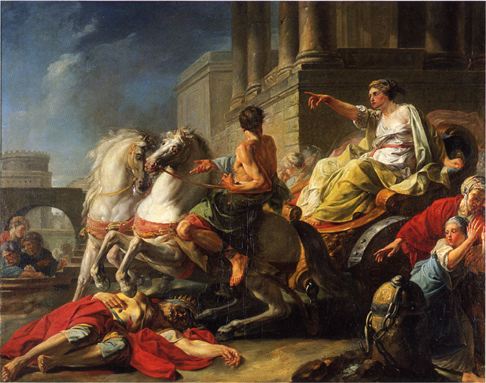
Little is known for certain about Servius Tullius’s early life, but Roman legends (and his name) suggest that he was born a slave. Some sources claim that he was the son of a princess captured and sold into slavery during the siege of Corniculum, but others suggest the Roman nobility simply made the story up to mask their embarrassment at being ruled by a commoner. The legends do seem to agree that he was destined for greatness from childhood, since his head had a tendency to burst into divine flames while he slept.
Eventually, he came to the attention of Tanaquil, the wife of King Tarquinius Priscus of Rome, who was said to be skilled in the arts of divination. After predicting that Servius would have a great future, Tanaquil married him to her daughter and began scheming to make him her husband’s successor. This annoyed the powerful children of the previous king, who were on course to inherit the throne themselves, and Tarquinius Priscus quickly took an axe to the head under mysterious circumstances. But Tanaquil outmaneuvered her husband’s killers by claiming that he had miraculously survived the attack and appointed Servius regent while he recovered. Once Servius had cemented his power, the old king’s death was announced and Servius duly took his place.
His reign lasted for roughly 43 years, during which he defeated the Etruscans and ordered Rome’s first census, dividing the city into six official classes. His reign was a time of prosperity, and his reputation was so good that it actually makes it hard to be sure what else he did do, since later Romans had a tendency to attribute most of the city’s traditions to him. He died around 535 B.C., when legend says he was murdered on the orders of his daughter Tullia, who subsequently rode over his body on the way to see her husband crowned king.
9Liu Bang, Emperor Of Han
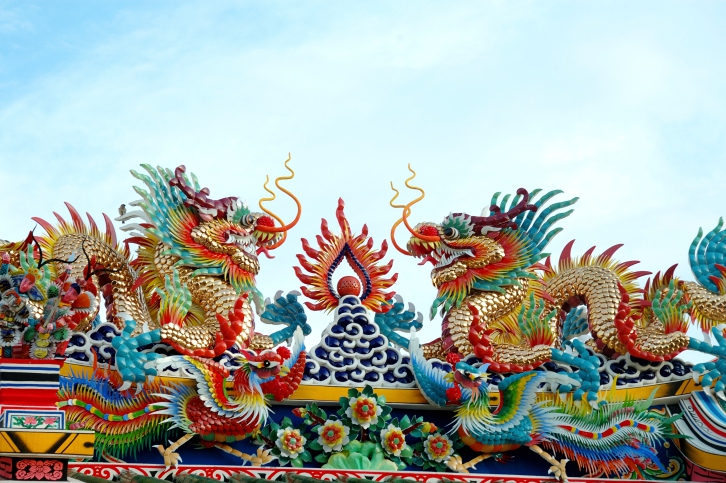
Liu Bang was born into a peasant family in Pei County (now part of Jiangsu Province) around 256 B.C. According to legend, his birth was marked by a great storm and the mysterious appearance of a spectral dragon hovering next to the bed. He also had 72 black moles on his thigh, but this was considered a very lucky number in China, so nobody minded.
As an adult, Liu Bang found work as a government official in the Si River precinct, where he spent most of his time drinking and chasing women. The legends say that he never paid for his booze, but the wine shops never pressed the matter, since the ghostly image of a dragon that always appeared when he passed out was good for attracting customers. His good luck continued when a prominent magistrate came to town, prompting the local officials to collect gifts for him. Liu gave nothing, but wrote on his calling card that he had given a large sum of cash. Instead of being angry at the ruse, the magistrate was so struck by Liu’s distinguished face that he married his daughter to him.
One day, Liu was performing a prisoner escort and happened to witness the grand procession of the first emperor of the Qin Dynasty, Qin Shi Huang. Legends claim that he was so impressed by the lavish scene that he remarked: “As a man, one should live a life like that.”
For whatever reason, it is known that Liu rebelled after the death of the emperor, joining a group led by the warlord Xiang Yu. Liu soon proved himself a formidable leader and gained a large following, prompting Xiang Yu to give him control of the old kingdom of Han in western China. This was a mistake, and the two men soon turned on each other for control of China. By 202, Xiang had committed suicide and Liu was proclaimed emperor. He was known as a colorful ruler, supposedly once grabbing the hat of a court scholar and urinating in it to show his disdain for education. Still, he is considered a humane and civilized emperor, lowering taxes on peasants and making strong efforts to revive the economy.
8Maximinus Thrax, Emperor Of Rome

Maximinus Thrax (“the Thracian”), was born in Thrace around A.D. 173. We know little of his life before he joined the Roman legions, but contemporary sources say that he worked herding sheep. If so, he was probably the most terrifying shepherd in history, since the same sources say he was a “human mountain” at least 2.5 meters (8 ft) tall and bulging with muscles. Though these accounts are likely exaggerated, he was soon noticed by the emperor Septimius Severus for his great strength in battle and eventually rose to command an army on the Rhine, where his troops proclaimed him emperor after Severus was murdered.
Unfortunately, Maximinus’s reign only lasted for three years, almost all of which he spent fending off invading tribes along the Danube and Rhine. Meanwhile, a group of wealthy African farmers had decided their taxes were too high, killed the local revenue officers, and proclaimed their own emperor, Gordian I. This lasted for about three weeks, at which point Gordian killed himself following the death of his son in battle against the governor of Numidia. However, the Roman senate, not fans of the barbarian Maximinus, took the opportunity to proclaim two new emperors, who were quickly forced out by Gordian’s grandson, Gordian III.
Angered by such a confusing series of revolts, Maximinus marched into Italy, but encountered determined resistance in the north, at which point his troops started to question if the whole thing was worth it. Maximinus was subsequently murdered along with his son in A.D. 238, by the same army that had previously made him emperor.
7Justinian, Justin & Theodora
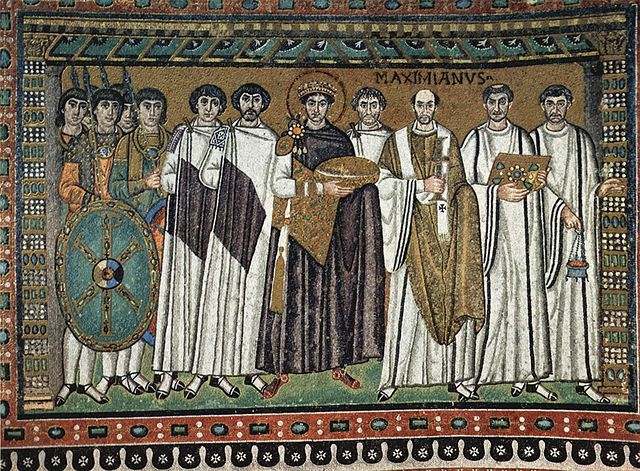
Born in A.D. 483, the Byzantine Emperor Justinian came from a Latin-speaking peasant family of Illyrian origin and always spoke Greek with a terrible accent. His real name was Petrus Sabbatius, but he took the name Justinian in honor of his uncle Justin, who had become commander of the palace guards after he and his friends set out for Constantinople with nothing more than “the clothes they had on their backs and a little bread in their pockets.” After Emperor Anastasius died without an heir, Justin, who commanded the only effective military force in the city, became his successor (although Justin himself claimed to have been made emperor “against his will” after the crowd threatened to riot unless officials got on with it and picked a new ruler).
Since Justin rose through the ranks to become emperor, he never received a formal education and Justinian probably became a key adviser to his uncle during his reign, which helped to prepare him for his own rule. By 521, he had been given the rank of consul and wrote a letter to the Pope referring to the Empire as “our state.” Justinian eventually succeeded his uncle in 527, having been formally made co-emperor four months earlier. His 38-year reign would see major governmental and legal reforms, as well as campaigns to retake North Africa and parts of Italy.
No less remarkable than the story of Justin and Justinian was the rise of Justinian’s wife, Theodora. Her father had been a bear trainer in Constantinople’s famous hippodrome and Theodora herself became an actress, a profession often associated with prostitution. It is well-documented that she exerted considerable influence over her husband and used her position to advocate for the rights of Roman women of all classes. She probably saved Justinian’s throne during the Nika riots, which started over chariot racing and soon threatened to engulf the entire city. While Justinian contemplated fleeing by ship, Theodora famously declared: “Never will I see the day when I am not saluted as empress.” The riots were subsequently crushed and Justinian’s reign ensured.
6Ivaylo The Cabbage, Tsar Of The Bulgars

Ivaylo’s date of birth is unknown, but he is generally considered to have come from northeast Bulgaria, likely near Provadia. He was called “Lakhanas” (Greek for “cabbage”) and “Bardovka” (Bulgarian for “lettuce”) because of his humble origins as an illiterate peasant. Around 1277, Ivaylo began raising a peasant army to combat the Mongol threat to his people, which was being inadequately dealt with by the ineffective Tsar Konstantin.
After gaining multiple victories, tales of Ivaylo began to spread, causing Konstantin to send an army to give “the Cabbage” the chop. But his forces were defeated and Konstantin himself lost his life in the battle, with some accounts claiming that Ivaylo personally killed him in single combat. Having defeated both the Mongols and his own ruler, Ivaylo accepted an offer to marry Konstantin’s wife and was officially crowned king in 1278. His reign was rather short, lasting only a year before he was killed by the Mongols. Still, he is considered to have led the only successful peasant uprising in medieval European history.
5Zhu Yuanzhang, Emperor Of China
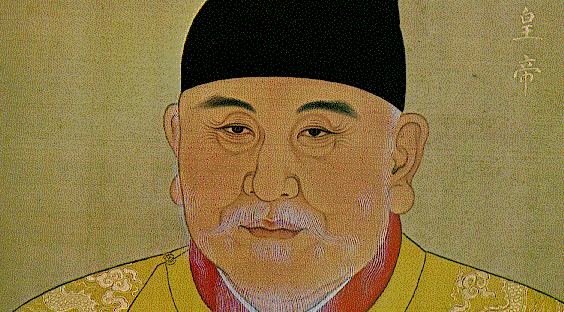
Born Zhu Chongba around A.D. 1328, the first Ming emperor came from a bitterly poor peasant family in Haozhou (now Fengyang, in Anhui Province), China. His early years are obscure, although later accounts claim he often had to survive by eating grass and tree bark. By the age of 16, he had become an orphan and was forced to seek refuge at a monastery near Nanjing. He began training to become a monk and learned to read and write, something that would be of great use to him later in life. But while his years at the monastery would eventually pay off, it must have been a miserable life at the time, and he occasionally had to beg for food in nearby settlements.
When Zhu was 24, the monastery was destroyed by government forces, who suspected the monks were involved with the Red Turbans, a rebel group influenced by the powerful White Lotus secret society. Fleeing the destruction, Zhu joined the Red Turbans himself, quickly proving an able soldier and rising through the ranks to command his own army. In 1356, forces loyal to Zhu, who had by then changed his name to Zhu Yuanzhang, captured the city of Nanjing, which would later become the capital of the Ming Dynasty.
In 1363, he cemented his power by killing rival rebel leader Chen Youliang in the Battle of Lake Poyang. Five years later, his forces took the Yuan capital at what is now Beijing, allowing Zhu to declare himself emperor at Nanjing, founding the famed Ming Dynasty.
4Karin Mansdotter, Queen Of Sweden
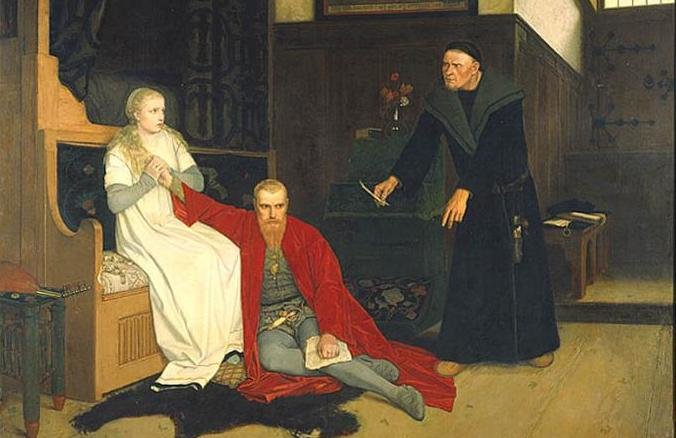
Karin Mansdotter was born on November 6, 1550 (we know the exact date because her future husband was an amateur astrologer and kept her horoscope), to a common soldier and his wife. Early in life, she probably assisted her mother selling vegetables and nuts. This was romanticized in stories claiming that the king was riding through the market one day when he spotted Karin and was so astonished by her beauty that he married her. In reality, she was employed as a servant by the king’s favorite musician and probably met Eric XIV that way.
Either way, Eric became infatuated with her, and after a period as his royal mistress, she was officially crowned Queen of Sweden in a magnificent ceremony in 1568. Unfortunately, her new husband was mentally unstable and had already alienated the nobility by murdering two members of the powerful Sture family. When he had his own brothers imprisoned for failing to attend his wedding, a rebellion broke out. Karin’s reign as queen only lasted 87 days.
After Eric was dethroned, the couple were held under house arrest for several years, until Eric was poisoned after attempting a coup to regain power. Karin was widely considered to be a calming influence on her husband and was set free after no evidence could be found of her involvement in his crimes. Due to being widely loved by the common people, she was given one of the royal estates in Finland, where she lived until her death in 1612.
3Dowager Empress Cixi
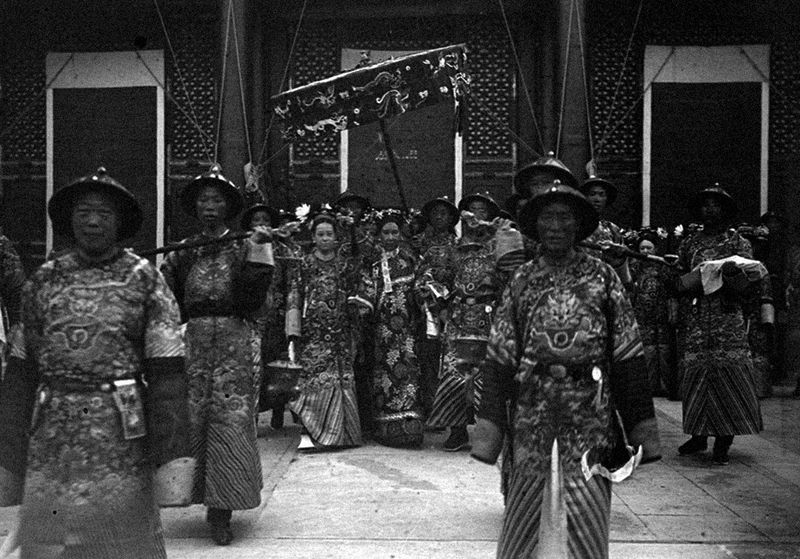
Born November 29, 1835, in Beijing, China, the Dowager Empress Cixi became one of the most powerful women in Chinese history, despite her origins in a “rather ordinary” Manchu family. Her rise to power began at the age of 16, when she was selected to join the emperor’s harem as a lowly concubine.
The story goes that the emperor overheard her singing one night and was entranced enough to make her one of his favorite concubines. She became pregnant with his son in 1856, which earned her the title of “Tzu Hsi,” meaning “Empress of the Western Palace” and often written “Cixi” in English. When the emperor died in 1861, she became regent for her five-year-old son, the future emperor Tongzhi. She shared the regency with the former emperor’s senior consort, Dowager Empress Ci’an, who was the mother of Tongzhi’s brother, Prince Gong.
This continued until Tongzhi became emperor in his own right at the age of 17. When he died without an heir 13 years later, Cixi was able to install her three-year-old nephew as emperor, once again assuming the regency with Ci’an and Prince Gong.
Gong was ousted by the empresses three years later, and Cixi became the sole ruler when Ci’an died in 1881, retiring to a lavish summer palace after her nephew came of age. However, she was called to assume the title of empress yet again in 1898, following the crushing defeat of the Chinese forces in the Sino-Japanese war. She remained empress until her death in 1908 and is still an enigmatic figure in Chinese history.
2Mao Tse Tung
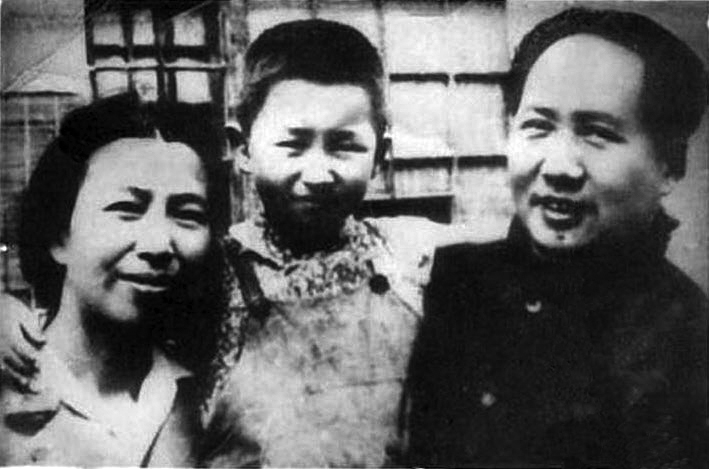
Born December 26, 1893, Mao Tse Tung “ruled a quarter of the world’s population for 25 years and made China one of the most powerful countries in the world.” He did all this despite coming from a humble family of farmers in Shaoshan, Hunan Province, who had tilled their three-acre plot for generations.
Mao did manage to attend a small village school for a few years, but by 13 he was working full-time on the farm. His path to greatness arguably came through marriage—although not in the way you would think. When he was 14, his father essentially forced him into an arranged marriage to a local girl, which Mao resolutely refused to accept. Three years later, with the marriage still unconsummated, he left home in search of a different life, enrolling in a secondary school in Changsha. His wife later died of dysentery. (Mao would eventually forge a lasting union with his fourth wife, Jiang Qing, pictured above.)
While he was in Changsha, the Xinhua Revolution broke out, and Mao decided to enlist in the Revolutionary Army of Sun Yat-Sen’s Kuomintang Party. He served with them for a short time before becoming an assistant librarian in Peking, where he developed ties to the Communist Party. By 1935, he was one of the key Communist leaders and was the main strategist of the victory over the Nationalists in the Civil War of 1946–1949, becoming the first leader of the People’s Republic of China.
His role was described as “equivalent to that of president, with Chou En-lai serving as his prime minister.” Over the course of the next 30 years, Mao would implement such economic and social programs as the Great Leap Forward of 1958–1962 and the Cultural Revolution of 1966–1976. The Great Leap Forward alone resulted in an estimated 30 million Chinese citizens dying from starvation, and the country continues to come to terms with his legacy.
1Phoolan Devi, The Bandit Queen
While Phoolan Devi never achieved formal royal status, she was given the title of “the Bandit Queen” by the Indian media, and the events of her life have become the stuff of modern legend. Born to a poor family in Uttar Pradesh in 1963, she endured an incredibly difficult early life. Her father owned a small plot of land, but this barely provided for a family of six, and Phoolan endured many nights of hunger in her youth.
At the age of 11, Phoolan was forced into an arranged marriage to an abusive husband. Eventually, she could handle no more and escaped, walking across an area the width of Texas to return home, where her scandalized family promptly encouraged her to commit suicide. She refused, but her troubles were only just starting.
Because she had left her husband, Phoolan was scorned by most of the villagers, but she still ably defended her father in a court battle with her well-connected cousin, who had fraudulently acquired most of the family’s land. When she was 21, she was arrested for allegedly robbing her cousin’s house. While in prison, she was repeatedly beaten and raped by her jailers. Later, she was kidnapped by a group of lower-caste bandits, or dacoits, who haunted the ravines of Northern India. Luckily, one of the bandits, Vikram Mallah, had admired Phoolan over the years. After shooting the gang’s leader, Mallah became the new boss and Phoolan became his mistress.
The good times didn’t last. Mallah was eventually killed by rival bandits and Phoolan was captured and taken to the village of Behmai, where she was publicly humiliated and repeatedly raped by upper-caste officials and landowners. On the 23rd day of her captivity, she escaped and rejoined her gang, who pronounced her their new leader in Mallah’s place. Her first act was to return to Behmai to exact retribution.
Phoolan’s revenge became known as the St. Valentine’s Day Massacre, as at least 22 men were publicly executed, igniting a massive manhunt for her. This lasted a little over two years, until she managed to successfully negotiate terms of surrender for herself and several other bandits. During her time on the run, it is estimated she committed at least 18 kidnappings for ransom and supposedly regularly gave money to the poor, earning her fame as a modern-day Robin Hood. After her surrender, she served only 11 years in prison before the state withdrew all charges against her. (No one was ever actually convicted of the Behmai massacre, since no witnesses were willing to testify.)
After her release, Phoolan successfully ran for parliament. She had just finished her second term when she was gunned down outside of her home on July 25, 2001, at the age of 37. Her death was not entirely unexpected, with one former dacoit predicting: “If Phoolan has killed, she will be killed in return. They will find her, of that I’m sure. It’s blood for blood in the ravines.”
James Jackson loves writing sci-fi, fantasy, and horror, but occasionally likes to write lists about cool stuff.

